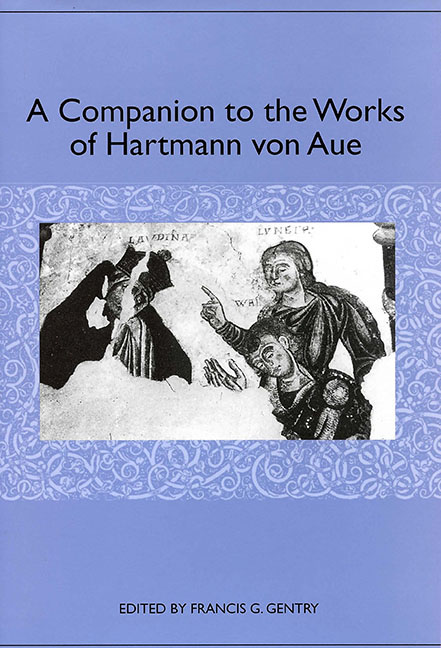Book contents
- Frontmatter
- Contents
- Acknowledgments
- Introduction
- Hartmann's Theological Milieu
- Hartmann von Aue as Lyricist
- Hartmann von Aue and Chrétien de Troyes: Respective Approaches to the Matter of Britain
- Gender and Love in the Epic Romances of Hartmann von Aue
- The Two-Fold Path: Erec and Enite on the Road to Wisdom
- The Body in Pain in the Works of Hartmann von Aue
- Illness and Cure in Hartmann von Aue's Arme Heinrich and Iwein
- Hartmann's Legends and the Bible
- Hartmann's Works in the Visual Arts
- The Medieval Literary Reception of Hartmann's Works
- A Tale of Sacrifice and Love: Literary Way Stations of the Arme Heinrich from the Brothers Grimm to Tankred Dorst
- Editions and Translations of Hartmann's Works
- Works Cited
- Notes on the Contributors
- Index
The Two-Fold Path: Erec and Enite on the Road to Wisdom
Published online by Cambridge University Press: 27 April 2017
- Frontmatter
- Contents
- Acknowledgments
- Introduction
- Hartmann's Theological Milieu
- Hartmann von Aue as Lyricist
- Hartmann von Aue and Chrétien de Troyes: Respective Approaches to the Matter of Britain
- Gender and Love in the Epic Romances of Hartmann von Aue
- The Two-Fold Path: Erec and Enite on the Road to Wisdom
- The Body in Pain in the Works of Hartmann von Aue
- Illness and Cure in Hartmann von Aue's Arme Heinrich and Iwein
- Hartmann's Legends and the Bible
- Hartmann's Works in the Visual Arts
- The Medieval Literary Reception of Hartmann's Works
- A Tale of Sacrifice and Love: Literary Way Stations of the Arme Heinrich from the Brothers Grimm to Tankred Dorst
- Editions and Translations of Hartmann's Works
- Works Cited
- Notes on the Contributors
- Index
Summary
In his essay in this volume, Alois Wolf provides a comprehensive and finely nuanced reading of Chrétien's and Hartmann's versions of Erec. Wolf is able to demonstrate clearly that Chrétien's depiction of Arthur and his court contains several allusions to contemporary historical events while Hartmann's does not. Chrétien strives to develop the image of Erec the ruler, while Hartmann concentrates more on the underlying humanity of the various episodes and their religious and theological implications. The German poet's gaze is steadily directed at Erec, together with Enite, as a lover rather than a ruler. In the following I propose that while Hartmann does avoid obvious allusions to contemporary events and personalities, he does not distance himself from considerations of the responsibilities of those who rule. Quite the contrary, by moving in a historically indefinable environment, he frees himself to consider the greater issues of valor, justice, and compassion and their place in the chivalric world.
Hartmann's Erec introduces the splendor of the Arthurian world to the medieval German literary landscape. Hartmann's immediate — and, perhaps, only — source is the like-named work by Chrétien de Troyes (ca. 1165–70). While there may have been earlier, stylistically more primitive Arthurian tales in Germany that now no longer exist, it is Hartmann to whom we owe the first complete Arthurian epic in a formally and linguistically sophisticated German. As Wolf demonstrates, Hartmann alters his source not only quantitatively but also qualitatively. The result of these modifications in his tale proves to be paradigmatic for subsequent Arthurian romances in German, including Wolfram's Parzival. The portrayal of the great king himself, for example, as well as that of his court becomes typical. In the German tales, Arthur undergoes no development in his character, engages in no serious quests or other chivalric pursuits, and is, in general, not a very active king — disregarding the rather questionable Hunt for the White Stag in Erec. He is the focal point of a static society in which no growth or progress is possible — or, possibly, even desirable. Its saving grace is that it is the environment in which the heroes must first prove themselves.
- Type
- Chapter
- Information
- A Companion to the Works of Hartmann von Aue , pp. 93 - 104Publisher: Boydell & BrewerPrint publication year: 2004



